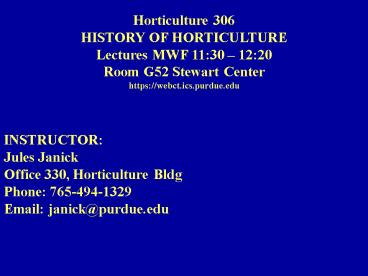INSTRUCTOR: - PowerPoint PPT Presentation
1 / 19
Title: INSTRUCTOR:
1
Horticulture 306 HISTORY OF HORTICULTURE Lectures
MWF 1130 1220 Room G52 Stewart
Center https//webct.ics.purdue.edu
INSTRUCTOR Jules Janick Office 330, Horticulture
Bldg Phone 765-494-1329 Email janick_at_purdue.edu
2
THE COURSE A multi-disciplinary course that
introduces students to the history of agriculture
with special emphasis on horticulture. Because
the history of agriculture and horticulture is so
broad and so important to the development of
civilization, the course will include a broad
view of agricultural and horticultural technology
in science, medicine, culture and art. The course
objectives are
3
1. To survey the historical record of
agriculture and horticulture from prehistory
to the present. 2. To trace the origins and
development of agriculture and horticulture
and its relationship to modern civilization
and culture. 3. To gain an appreciation for how
agricultural and horticultural developments
have influence modern science and technology.
4
GRADES Grades will consist of two exams, take
home quizzes, term paper, and a final. Final
grade will be based on total points. Points Exa
m 1 100 Exam 2 100 540-600
A Quizzes 100 480-539 B Term
Paper 100 420-479 C Final 200 360-419
D Total 600 Take home Quizzes Delivered on Friday (download
from webct) Must by in by Monday Can be turned
in via an email attachment
5
COURSE OUTLINE Week 1. Origins of
Agriculture Week 2. Origins of Crop Plants Week
3. Ancient Egyptian Agriculture Week 4.
Mesopotamia and the Fertile Cresent Week 5.
Agricultural Development in Asia Week 6.
Agricultural Development in Pre-Columbian
America Week 7. Greek and Roman Agriculture Week
8. Medieval Agriculture in Europe Week 9.
Agriculture and Medicine Week 10. The History of
Spices Week 11. Experimental Science Week 12.
Agricultural Scientific Revolution Week 13.
Horticulture, Politics, and World Affairs Weeks
14 and 15. Horticulture in Literature and Art
6
Lecture 1 Dating the Past Geologic, Archeologic,
Biologic, and Human Culture
7
Dating the Past (years ago)
8
Dating the Past (years ago)
9
Dating the Past (years ago)
10
Dating the Past (years ago)
11
The Emergence of Man
Source J.N. Leonard, 1973 First Farmers, Time
Life
12
(No Transcript)
13
(No Transcript)
14
(No Transcript)
15
Current Era 1 Height of Roman Empire, Birth of
Christ, Destruction of Pompei (79), Persecution
of Christians, Emperor Constantine,
Establishment of Christian dominance, Decline of
Roman Empire 500 Rise of Islam, Dark Ages in
Europe, Plague, Tang Dynasty in China, Sung
Dynasty in China, Vikings 1000 Norman Conquest
(1044), Cathedrals constructed, Genghis Khan,
Ottoman empire in Turkey, Aztecs settle in
Mexico, Printing press1500 BEGINNING OF MODERN
ERA, Printed Herbals, Columbus, Age of
Exploration
16
1600 William Shakespeare, Francis Bacon,
Rembrant, Cromwell 1700 Gardens of Versailles,
Issac Newton, US Revolution (1776), Carolus
Linnaeus 1800 Thomas Andrew Knight Beginning of
Horticultural Science, Charles Darwin, Gregor
Mendel Birth of Genetics, Morrill Act
1900 Liberty Hyde Bailey Wright Brothers
flight ASHS founded, Rediscovery of Mendels
paper, Beginning of Genetics1910 Thomas Hunt
Morgan Drosophila, Mechanization of
Agriculture, World War I
17
1920 Hybrid corn, vitamins, Rise of tractor in
agriculture 1930 World Depression, Dust
Bowl 1940 World War II, VE,VJ day, Cold
War 1950 DNA Structure, Watson Crick, Korean
Conflict, Genetic Code 1960 Herbicides,
Vietnam Era 1970 Man on the Moon (1969), Green
Revolution, Plasticulture, Tissue culture,
Micropropagation 1980 Gene transformation,
Molecular Biology 1990 Gulf War, computers,
Information Revolution Internet 2000 Genomics,
Directed Mutation
18
Summary
Dates to Remember
Years ago 4.5 Billion Origin of Earth 3.5
Billion Origin of Life 1 Billion Oxygen-breathin
g Animals 200 Million Age of Dinosaurs 2
Million Tools Used by Early Man 1 Million Homo
erectus
19
Years ago Dates to Remember 200,000 Neandertal,
Cro-magnon 10,000 Neolithic Revolution 8,000 Agri
culture Develops 5,000 Bronze Age-Pyramids-Stoneh
enge Writing begins 3,000 Iron
Age 2,500 Golden Age of Greece 2,000 Common
Era 1,500 Fall of Rome 1,000 Norman
Conquest 500 Modern Times-Columbus 0 Genetic
Code













![❤[PDF]⚡ The Best Ever Book of Swimming Instructor Jokes: Lots and Lots of Jokes PowerPoint PPT Presentation](https://s3.amazonaws.com/images.powershow.com/10058713.th0.jpg?_=20240619079)


![[PDF] DOWNLOAD The Best Ever Book of Swimming Instructor Jokes: Lots a PowerPoint PPT Presentation](https://s3.amazonaws.com/images.powershow.com/10058283.th0.jpg?_=20240619024)














